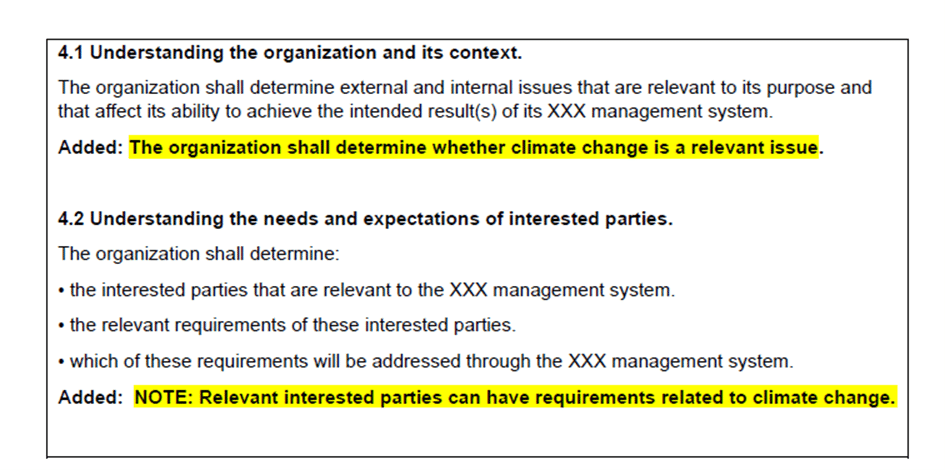ISO 9001 Climate Change Amendment
Effective Immediately
A new Amendment to ISO 9001 has been recently published and it impacts all companies that are currently ISO 9001 certified as well as any certifications going forward.
What are the New Climate Change Amendments for ISO Certification?
The new climate change amendments are one-line additions to ISO Management System Standards, Clauses 4.1 and 4.2.
Clause 4.1 is about understanding the organization and its context. The climate change addition to this clause is, “The organization shall determine whether climate change is a relevant issue.”
Clause 4.2 is about understanding the needs and expectations of interested parties. The climate change addition to this clause is, “NOTE: Relevant interested parties can have requirements related to climate change.”
What is the Intent of the Climate Change Requirements Added to Clauses 4.1 and 4.2?
“The overall intent of the requirements for clauses 4.1 and 4.2 remain unchanged; these clauses already include the need for the organization to consider all internal and external issues that can impact the effectiveness of their management system; these new inclusions are assuring that Climate Change is considered within the management system and that it is an external factor that is important enough for our community to require organizations to consider it now.” – ANAB Heads Up Issue: 527

What is the Climate Change Amendment?
According to the IAF/ISO (International Organization for Standardization) 22 February 2024 Joint Communiqué and Published on February 23, 2024, the Climate Action Amendment has been added to existing and new ISO Management Systems Standards (MSS) to reflect ISO’s Climate Action commitments.
“It is important that all parties understand the intent so that the changes can be consistently introduced and implemented.”
“In support of the ISO London Declaration on Climate Change, ISO passed a resolution that will result in two new statements of text being added to a number of existing management system standards and will be included in all new standards under development/revision, to address the need to consider the effect of Climate Change on the ability to achieve the intended results of the management system. The changes will be introduced initially as Amendments to these published standards.
The changes (two new statements) will be incorporated into the new text of the Harmonized Structure (Appendix 2 of the Annex SL in the ISO/IEC Directives Part 1 Consolidated ISO Supplement) as follows.”

From ANAB Heads Up Issue 527:
“FAQs from ANAB
What is the transition process because of the amendments?
The amendments are effective as of the date of publication and there is no transition for implementation because of the overall intent quoted above. See the IAF Final Decision for more details.
What is required of an applicant or certified organization?
As detailed in the IAF Final Decision, certified organizations (including applicants) need to consider if Climate Change is a relevant issue within their own management system(s). If so, as with other relevant issues, the organization must consider it within their system’s objectives and risk evaluation, within the scope of their management system(s). See the IAF Final Decision for more details.
Does the amendment to the management system standard/s require a revision to the certification document?
No, a revised certificate is not required to be issued for the sole purpose of recognizing the amendment to the management system standard(s). Please refer to the IAF Final Decision, Timing section.”
See the IAF Final Decision for more details.
Considering Climate Change
Integrating climate change considerations into global standards underscores the need to recognize its impact on our external environment. By incorporating these climate change provisions into standards, we can activate positive effects on both a local and global scale.
Why is Climate Change Important for Businesses to Consider?
Climate change is important for businesses to consider for several reasons:
Regulatory Compliance:
Governments around the world are implementing regulations to mitigate climate change, such as emission limits, carbon pricing mechanisms, and sustainability reporting requirements. Businesses need to comply with these regulations to avoid penalties and maintain their operating licenses.
Reputation and Brand Image:
Consumers are increasingly concerned about climate change and sustainability. Businesses that demonstrate a commitment to addressing climate change and reducing their environmental footprint can enhance their reputation and brand image, leading to increased customer loyalty and trust.
Financial Risks and Opportunities:
Climate change poses both financial risks and opportunities for businesses. Risks include physical risks from extreme weather events, regulatory risks from carbon pricing and emissions regulations, and reputational risks from environmental controversies. On the other hand, businesses that invest in sustainable practices can access new markets, reduce operating costs through energy efficiency measures, and attract investment from socially responsible investors.

Supply Chain Resilience:
Climate change can disrupt supply chains through extreme weather events, resource shortages, and changes in consumer preferences. Businesses need to assess the resilience of their supply chains and implement measures to mitigate climate-related risks, such as diversifying suppliers, improving logistics, and enhancing communication with stakeholders.
Innovation and Adaptation:
Addressing climate change requires innovation and adaptation in business practices, products, and services. Businesses that invest in research and development of sustainable technologies and solutions can gain a competitive advantage in the marketplace and position themselves as leaders in their industries.
Employee Engagement and Talent Acquisition:
Employees, particularly younger generations, are increasingly concerned about climate change and want to work for companies that share their values. Businesses that prioritize sustainability and climate action can attract and retain top talent, enhance employee engagement, and improve morale and productivity.
Access to Markets and Investors:
Many governments, investors, and customers are increasingly demanding businesses to disclose their environmental performance and demonstrate their commitment to sustainability. Businesses that integrate climate change considerations into their operations can access new markets, secure investment capital, and improve their long-term financial performance.

Overall, considering climate change is important for businesses to ensure regulatory compliance, enhance reputation and brand image, manage financial risks and opportunities, build supply chain resilience, foster innovation and adaptation, engage employees and attract talent, and access markets and investors. By addressing climate change, businesses can contribute to a sustainable future while also securing their long-term success.
About Scott Dawson
From 2010-2025, Scott Dawson, President of Core Business Solutions, was an active voting member of the U.S. Technical Advisory Group (TAG) to ISO Technical Committee 176 (TC 176). TAG 176 members meet to discuss and develop U.S. positions for Quality Management standards, including ISO 9001:2015, which will be revised in 2026. Our Director of Consulting Services now stays involved in the U.S. TAG 176.

Get a Free Quote
Talk to a Sales Consultant Today
Or call 866-354-0300 and select option 2



